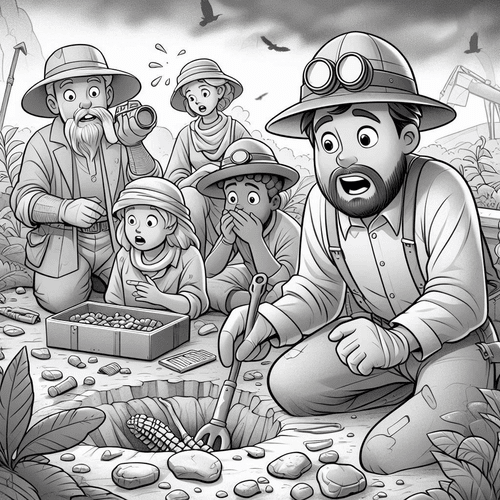The Cambrian Explosion: A Challenge for Evolution
The Cambrian Explosion: How’s It A Challenge for Evolution
The Cambrian Explosion refers to a relatively short geological period, estimated by evolutionists to have occurred approximately 541 million years ago, during which a remarkable diversity of complex, multicellular life forms appeared abruptly in the fossil record. This event is marked by the sudden emergence of most major animal phyla, including arthropods, molluscs, echinoderms, and chordates, within a span of about 10 million years—well, that too, is an evolutionist estimate—a geologically brief period according to evolutionary timelines.
Discovered in the early 20th century through studies of Cambrian strata, particularly in places such as the Burgess Shale in Canada, the Cambrian Explosion is a challenge for evolution. It presents a significant puzzle for palaeontologists. These strata revealed an unprecedented burst of life forms with complex structures, distinct body plans, and advanced features such as exoskeletons, eyes, and intricate nervous systems.
The Challenge for Evolutionists:
The Cambrian Explosion poses a challenge to the traditional Darwinian model of evolution, which anticipates gradual changes accumulating over long periods through natural selection and mutation. Here are the primary difficulties it presents for evolutionists:
-
Abrupt Appearance of Complex Life: Evolutionary theory predicts a slow, gradual development of complexity from simple ancestors. However, the Cambrian Explosion reveals a rapid emergence of highly complex organisms without clear precursors in the earlier fossil record.
-
Lack of Transitional Fossils: The pre-Cambrian fossil record contains predominantly simple, single-celled organisms or simple multicellular life. The sudden transition to diverse, complex organisms in the Cambrian period lacks the expected multitude of transitional forms.
-
Genetic and Developmental Complexity: The sudden appearance of distinct body plans suggests the rapid introduction of significant genetic information. This raises questions about the mechanisms capable of producing such a vast amount of genetic novelty in a relatively short period.
Evolutionists’ Response:
Evolutionary scientists have proposed several hypotheses to address these challenges:
- Increased Oxygen Levels: Some scientists suggest a rise in atmospheric oxygen levels prior to the Cambrian period allowed for the development of larger, more complex organisms.
- Genetic Innovations: The hypothesis that crucial genetic changes, such as the evolution of Hox genes (which control body plan development), enabled rapid diversification is another explanation. These genetic innovations could have facilitated the rapid emergence of new body plans.
- Ecological and Environmental Factors: Changes in the environment, such as the development of predation, might have driven an “arms race,” spurring rapid evolutionary changes. Additionally, the melting of “Snowball Earth” (a hypothesized global glaciation event) might have created favourable conditions for diversification.
Creationists’ Rebuttal:
Creationists provide several counterarguments to the evolutionary explanations for the Cambrian Explosion:
-
Design Argument: The sudden appearance of complex life forms with fully developed features aligns more closely with the concept of intelligent design rather than gradual evolution. Creationists argue the intricate structures and functions observed in Cambrian organisms indicate purposeful design rather than random mutations and natural selection.
-
Insufficient Time for Evolution: Creationists contend the proposed evolutionary mechanisms cannot account for the rapid pace of change observed in the Cambrian Explosion. The timeframe is too brief for the accumulation of vast genetic information required to produce such diverse and complex life forms through natural processes alone.
-
Fossil Record Consistency: The lack of transitional fossils before the Cambrian period is seen by creationists as evidence against the gradual evolutionary model. They argue the fossil record’s pattern is more consistent with a sudden creation of life forms, as described in the biblical account of creation.
-
Complexity from the Start: Creationists emphasize the complexity of Cambrian organisms appears fully formed from the beginning, without simpler antecedents. This observation supports the idea of an initial creation event with distinct, complex organisms rather than a slow evolutionary progression.
-
Questionable Evolutionary Time Estimates: Creationists also challenge the dating methods used by evolutionists to estimate the age of the Cambrian period. They argue these methods, such as radiometric dating, rely on assumptions about initial conditions, decay rates, and closed systems that may not be accurate. Creationists often advocate for a younger Earth based on a literal interpretation of the biblical timeline, which significantly compresses the timeframe for the appearance of complex life. They suggest the evidence can be reinterpreted within a framework that supports a more recent creation event.
Conclusion:
The Cambrian Explosion remains a challenge for evolution. It is a topic of intense study and debate among scientists and scholars. For evolutionists, it presents a challenge that has spurred numerous hypotheses and further research into the mechanisms of life’s diversity. For creationists, it provides compelling evidence for a sudden creation of life forms, consistent with the idea of intelligent design and biblical creation.
Related Reads:
- The Universe’s Origin: Gaping Holes in Naturalist Explanations
- Conspicuous Gaps in the Evolution Narrative
- Defending Creationism: Responding to Evolutionist Challenges
- Exploring the Scientific Case for Creation
- Science Reinforces, not Buries, Faith in God
- Creation or Evolution: Let the Evidence Speak for Itself
Editor's Pick

Christian Obedience: God’s Empowerment or an Act of Our Will?
Every Christian knows the struggle. You’re fighting a besetting sin—again. You’ve resolved to do better—again. And you’re wondering: Should I [...]

The Throne-Room Vision: Who Did Isaiah See?
The scene is unforgettable: Isaiah stands in the temple, and suddenly the veil between heaven and earth tears open. He [...]

The Angel of the Lord: Can We Be Certain It Was Christ All Along?
Throughout the Old Testament, a mysterious figure appears: the Angel of the LORD. He speaks as God, bears God’s name, [...]
SUPPORT US:
Feel the Holy Spirit's gentle nudge to partner with us?
Donate Online:
Account Name: TRUTHS TO DIE FOR FOUNDATION
Account Number: 10243565459
Bank IFSC: IDFB0043391
Bank Name: IDFC FIRST BANK






